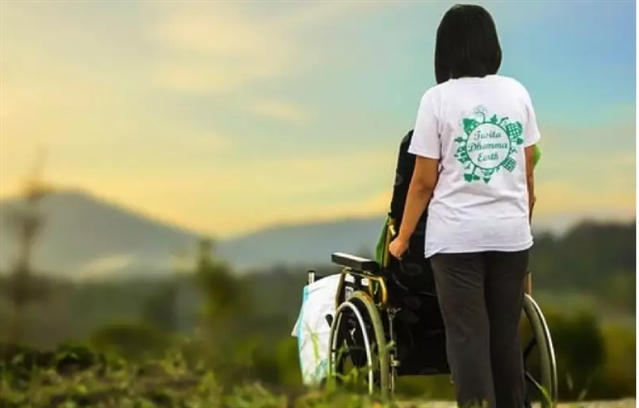论文标题:Heart health whispering: A randomized, controlled pilot study to promote nursing student perspective-taking on carers’ health risk behaviors
期刊:BMC Nursing
作者:Michelle Lobchuk et al
发表时间: 2018/5/24
数字识别码:10.1186/s12912-018-0291-1
原文链接:https://bmcnurs.biomedcentral.com/articles/10.1186/s12912-018-0291-1?utm_source=Other_website&utm_medium=Website_links&utm_content=DaiDen-BMC-BMC_Nursing-Biology-China&utm_campaign=BMCS_USG_BSCN_DD_BMCNursing
想要引导病患改变对健康有风险的行为并不容易,而这些微妙的健康风险行为也给护士向患者提供咨询服务增加了困难。在近期BMC Nursing发表的一项先导研究中,Michelle Lobchuk和她的同事们开发了一个名为“心灵健康耳语”的计划,旨在培养学习护理学的学生们的换位思考能力和同理心。

加拿大曼尼托巴大学的研究人员尝试开发一种名为“心灵健康耳语”的干预措施,希望能够弥补护理教育中的空白。研究人员认为这项计划颇有前景,因为“培养带着同理心提供咨询的信心和技巧是必需的”。
罹患慢性疾病不仅会极大程度地降低患者的生活质量,还会显著地增加他们的经济负担。因此,研究人员认为应该建立有效的咨询系统,帮助人们尽早改变健康风险行为。通过这种方法从根源上预防疾病,而不是在疾病发生之后才开始进行治疗。
但是,健康风险行为,例如吸烟、暴饮暴食或缺乏运动,往往与个体情况和压力变化有关。这些情况很难在医护人员提供的咨询过程中被充分了解。
在需要被居家照料的病人身上,这一点尤为明显。他们中的大部分都要面临被看护和失业的双重挑战,更容易有不切实际的高期待和压力,因而也更容易发生那些健康风险行为。不幸的是,被看护的人常常不觉得护理人员能够倾听或理解自己,而且他们往往认为护理人员并非真正在意他们的健康。而另一方面,护理人员也因为看护对象不愿意配合或自己缺乏同理心、耐心和时间而对给病人提供建议缺乏热情。
文章作者解释说,只有“当护理学生优先换位思考,带着同理心倾听,并区别每一个照料对象的具体情况”时,被照顾的对象才真正为自己的健康风险行为负责。此外,“培养护士的同理心应当在学生时期进行,因为此时他们的态度和技巧正在逐步形成”。
基于这样的想法,研究人员开发了“心灵健康耳语”计划,这是“一种以人为本的新型咨询和健康促进方法”。他们用视频记录了护理学生和病人扮演者之间的互动,并借此测试了护理学生如何通过自我评估和换位思考学习临床同理心。
研究认为换位思考属于可教授的内容,这里的换位思考主要是指让临床医护人员清楚地认识到他们自己对健康风险行为的想法和感受,然后尝试对其进行控制以便设身处地以看护对象的角度思考,最后再对这些推测进行验证。
训练临床同理心
在这项先导研究中,研究人员将学生分为两组,一组接受换位思考指导,另一组则不接受类似指导,随后研究人员通对两组学生学习临床同理心的能力进行了测试,测试包括了学生的自我评价和病人扮演者的评分。
接受换位思考培训的学生报告说,换位思考训练增强了他们的“探索能力”,使他们更好地感受到临床同理心,这也突出了未来将这种培训标准化并纳入教育课程的重要性。
尽管有一组学生并没有接受关于换位思考的教育,在与病人扮演者的对话中,两组学生还是都表现出了同理心。
有趣的是,病人扮演者对学生同理心的评价比学生的自我评价更高;更出乎意料的是,病人扮演者发现没有接受换位思考培训的学生更有同理心,他们觉得那些接受训练学生有时似乎“不够具有探索精神”、“不够真实”、“太过居高临下”。作者在讨论部分对此进行了解释,他们认为接受训练学生可能正在努力练习他们的新技巧,导致他们的表现比其他学生更差,而那些不接受训练的学生相比之下可能更加专注,只关心他们以前掌握的技巧。
病人扮演者和学生能够看到他们录制的对话,这种回顾性“视频分析”能够鼓励学生自我意识,他们对此的评价是“大开眼界”和“学习的好方法”。
作者得出的结论是,这项先导研究的结果“看起来很有前景,值得进一步检验”。“心灵健康耳语”计划对正在进行的实证研究具有启示性,鼓励临床工作人员培养临床同理心,以免在和患者就如何自我照料进行交谈时显得过于居高临下。
这种同理心的教育具有很大的潜在价值,它使学生有机会自我评估和并尝试实践与病人的“换位思考”,而这种教育的长期目标是通过提高咨询意见提供人员的技能和同理心改变被照料人的健康风险行为,并改善其治疗过程。
摘要:
Background
Lifestyle counseling is described as a “major breakthrough” in the control of chronic diseases. Counseling can be challenging to nurses due their lack of motivation to counsel, hesitancy to appear non-judgmental, lack of empathy, and lack of time. Nurses voice their need for more training in counseling communication skills. Our main objective was to engage in ongoing development and testing of a promising Heart Health Whispering perspective-taking intervention on nursing students’ clinical empathy, perceptual understanding, and client readiness to alter health risk behaviors.
Methods
In this randomized controlled pilot study, the full intervention (perspective-taking instructions, practice, and video-feedback) and partial intervention (video-feedback only) comprised 24 and 18 nursing students, respectively. Quantitative data were collected with a 10-item pre- and post-intervention clinical empathy tool, a one-item ‘readiness to change’ health risk behavior tool plus similarity ratings on students’ empathic accuracy were calculated. Data were analyzed using Independent Samples t Tests and mixed model ANCOVA models. Students’ and actors’ evaluative responses toward the intervention phases were collected by handwritten notes, and analyzed using content analysis and constant comparison techniques.
Results
The main finding was that students in the full intervention group reported greater clinical empathy in the post versus baseline condition. Students underestimated their clinical empathy in comparison to carers’ reports in the post-condition. In both intervention groups, carers reported more readiness to change in the post-condition. Carers identified favorable and unfavorable perceptions and outcomes of approaches taken by students. Students desired immediate and direct feedback after the video-dialogue and -tagging exercise.
Conclusions
Heart Health Whispering is a promising intervention to help educators in basic and continuing education to bolster nurse confidence in empathic conversations on health risk behaviors. This intervention incorporates commonly used strategies to teach empathic communication along with a novel video-analysis application of a perspective-taking task. Student and carer actor comments highlighted the value in opportunities for students to engage in self-evaluation and practicing the empathic process of taking the client’s perspective on health risk behaviors.
阅读论文原文,请访问
https://bmcnurs.biomedcentral.com/articles/10.1186/s12912-018-0291-1?utm_source=Other_website&utm_medium=Website_links&utm_content=DaiDen-BMC-BMC_Nursing-Biology-China&utm_campaign=BMCS_USG_BSCN_DD_BMCNursing
期刊介绍:BMC Nursing is an open access, peer-reviewed journal that considers articles on all aspects of nursing research, training, education and practice.
(来源:科学网)
特别声明:本文转载仅仅是出于传播信息的需要,并不意味着代表本网站观点或证实其内容的真实性;如其他媒体、网站或个人从本网站转载使用,须保留本网站注明的“来源”,并自负版权等法律责任;作者如果不希望被转载或者联系转载稿费等事宜,请与我们接洽。